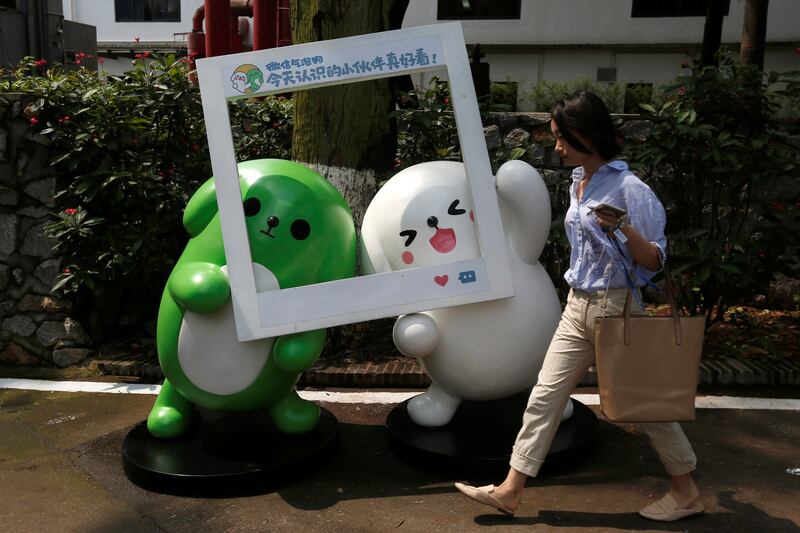China's security ministry has opened its official account on the country's popular everything app, urging its citizens to participate in counter-espionage work.
“Counter-espionage requires the mobilization of [the] entire society,” the Ministry of State Security said on WeChat on Tuesday.
WeChat has more than 1.3 billion active monthly users – think of it as Twitter, Facebook and daily banking all rolled into one.
The ministry calls on citizenry to “creatively carry out education about enemies [as defined by national security] and rule of law propaganda, strengthen case law interpretation, educate the masses through typical cases, enhance the awareness of counterespionage of the whole society, and form a strong joint force to maintain national security.”
State nationalist tabloid the Global Times opined, "National security is the foundation of national rejuvenation."
It added that putting all of China on an anti-espionage footing is a result of new “criminal activities” that endanger national security.
These, the tabloid wrote, include “setting up illegal maritime surveillance to steal China's military information, flipping Chinese scientists in the aerospace field with illicit payments, and concocting ‘forced labor’ lies about Xinjiang.”
Western China observers called the move "chilling."
"This literally sent chills down my spine. The Chinese Ministry of State Security calls on all Chinese citizens to participate in counter-espionage work; in other words, spying on fellow citizens and foreigners," said Strategy Risks CEO Isaac Stone Fish on Tuesday.
This week's move follows last month's passing of a Foreign Relations Law that redefined espionage.
The newly revised law – which has caused much consternation among foreign businesses operating in China as it theoretically labels the gathering of any information as espionage – gives Chinese law enforcement greater investigative powers. It took effect in July.
The U.S. and China are arguably locked into an escalating collision of their respective security interests, and as the U.S. ups the ante with, for example, restrictions on exports of sensitive technology to China, Beijing counters tick-for-tack.
An all-society drive to nab enemies of the state – not entirely new; China has long employed a " vacuum cleaner" approach to spycraft – suggests the escalation is not poised to abate.
In May this year, Chinese state media reported President Xi Jinping as saying that China’s national security issues were “considerably more complex and much more difficult” to deal with, adding that China needed to be ready to deal with “worst-case and most extreme scenarios”, in order to withstand “high winds and waves and even perilous storms.”
Last week, Beijing reacted strongly to CIA director William Burns' comments at the Aspen Security Forum about "progress" in rebuilding its spy networks in China.
China would take measures “to firmly safeguard our national security,” said foreign ministry spokesperson Mao Ning. She also noted the hypocrisy of spying on China, while criticizing China for engaging in espionage on the U.S.
U.S. ‘empire of hacking’
China frequently accuses the U.S. as being an evil “empire of hacking.”
On recent occasions the U.S. has accused China of infiltrating its emails and most recently installing malware that may compromise military and civilian power grids, communications systems and water supplies, China has lashed back, calling the U.S. "the world's No.1 hacking group."
Liu Pengyu, a spokesperson for the Chinese Embassy in Washington, recently told Radio Free Asia that the U.S. was “actually the biggest hacking empire and global cyber thief” and added that the U.S. government should stop “spreading disinformation [about cyber-spying on emails] to deflect public attention.”

Meanwhile, on Tuesday, China's Ministry of State Security was not coy about calling on citizens countrywide to become loyal spies for the motherland in its WeChat post. The ministry said citizens "should be encouraged to participate in counter-espionage work and should be commended, rewarded and protected," Reuters reported.
In July, Minister of State Security Chen Yixin wrote in a Chinese legal magazine that political security is “core” to the security of the security of China’s political system,
“The most fundamental is to safeguard the leadership and ruling position of the Communist Party of China and the socialist system with Chinese characteristics,” Chen wrote.
Arbitrary detentions
The U.S. State Department has urged Americans to reconsider travel to China over concerns of arbitrary detention as well as the use of exit bans.
Visiting Beijing in June, Secretary of State Antony Blinken raised three cases of wrongfully detained U.S. citizens. One is Kai Li, a Shanghai-born American businessman detained in 2016 and sentenced to 10 years in prison on spying charges.

In March, Australian ambassador to China Graham Fletcher said he was denied permission to sit in the public gallery for the trial of Australian national and Chinese state TV anchor Cheng Lei on charges of alleged breaches of the national security law.
Cheng was detained on suspicion of “spying” in August 2020, and continues to be held incommunicado for two years since.
Most recently, in July, Taiwan businessman Lee Meng-chu, also known as Morrison Lee, was allowed to leave China for Japan after serving nearly two years in prison for "spying."
Lee told RFA that he was a political hostage targeted due to anger in Beijing over Taiwanese President Tsai Ing-wen's vocal support for the Hong Kong protest movement, and her government's criticism of the Hong Kong authorities' response.
Edited by Mike Firn and Taejun Kang.
